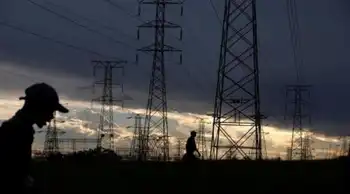Edison to decommission coal-fired Nevada power plant
By Associated Press
CSA Z463 Electrical Maintenance -
Our customized live online or in‑person group training can be delivered to your staff at your location.

- Live Online
- 6 hours Instructor-led
- Group Training Available
Southern California Edison operated the 1,580-megawatt plant since it came on line in 1971, and the company owned 56 percent of the facility on the Colorado River.
Edison shut down the plant in 2006 because it needed pollution-control upgrades to comply with a 1999 Clean Air Act settlement, a new water supply and pipeline upgrades costing $1.1 billion.
The plant's owners said they will decommission the plant and remove the generating facility from the 2,470-acre site. The dismantling is expected to start later this year and take about two years and $30 million to complete. Transmission lines and a switchyard will remain on site.
The plant's operating permits will be terminated next year.
Without a buyer for the plant, Edison spokesman Gil Alexander said the utility was left with two options — to decommission the plant and either sell the property or construct a renewable energy project.
"The owners have concluded that selling the plant is not a viable option," Alexander said.
Edison has studied the property, its topography and the climate and found that portions of the site could be used to generate solar power, but more detailed assessments are needed before a decision is made, Alexander said.
The 21 employees still working at the Mohave site will be offered other positions within the utility for which they are qualified, he said.
The Mohave plant had been one of the largest sources of pollution in the West. Environmentalists for decades blamed it for degrading views at the Grand Canyon and said it emitted high amounts of sulfur dioxide, nitrogen oxide and fine particulates.
They sued under the Clean Air Act to force the plant to add modern pollution controls like scrubbers, a filter system and new burners to reduce emissions by January 1, 2006, or shut down. Edison had planned to upgrade and restart the plant but said later that year that it needed too many repairs for the effort to go forward.
Roger Clark, air and energy director for the Grand Canyon Trust in Flagstaff, one of the groups that sued, said he's pleased the owners will dismantle the plant and are considering renewable energy.
"It's the final chapter on the story of Mohave as a coal plant," Clark said. "Until the owners decided to go ahead and decommission it and take it apart, there was always a chance someone could buy it and crank it up again."
The Salt River Project, which owns 20 percent of the plant, had sought to take over operation from Edison, but abandoned the effort in 2007 after its offer to buy Edison's ownership interest was rebuffed.
Other owners of the plant included Nevada Power Co. with 14 percent and the Los Angeles Department of Water and Power with 10 percent.
The plant had been fueled by coal from the Hopi and Navajo reservations in northeast Arizona, mixed with water and transported by a 273-mile pipeline to the plant. When the plant closed, so did the Black Mesa Mine in Kayenta, delivering a substantial blow to the economies of the tribes.
George Hardeen, a spokesman for Navajo President Joe Shirley Jr., said the tribe held out hope that Mohave might reopen, but none of the talks bore fruit. The tribe has not been able to replace the $29 million in annual coal revenues from the mine that supplied coal exclusively to Mohave.











